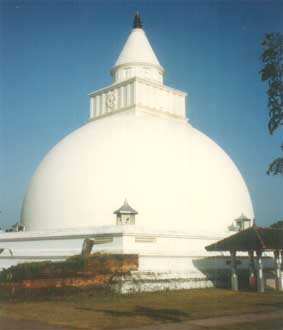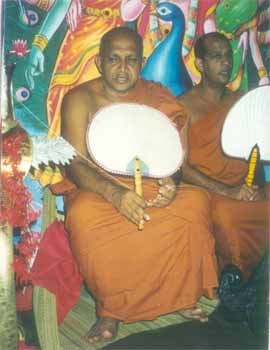|
| |||||||||||||

Kataragama 2003 Interview Series:
|
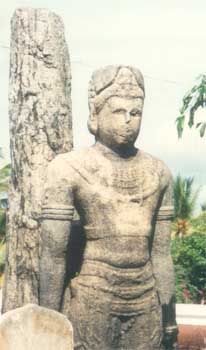
|
|
King Mahasena
|
Soratha: According to our Sri Lankan tradition, Lord Buddha visited sixteen places in Sri Lanka during his lifetime, including Kataragama. On that occasion, Mahasena (or Mahaghosa), the local ruler of Kataragama, duly welcomed the Lord and his retinue and found delight in His sublime Teachings.
Our traditions say that Mahasena took refuge in the Triple Gem and vowed to remain to protect and promote the Buddhist religion and its followers for all time to come.
Some scholars believe that Kataragama Deviyo was a local chieftain who was later elevated to deva status. But tradition insists that good ruler Mahasena is still alive and ruling in Kataragama even today.
Many Buddhists believe that the Kataragama God is a bodhisattva (Buddha-to-be) having the power and compassion to intervene in the lives of those who appeal to him. He is the guardian and friend of Sri Lankan Buddhists especially, but he will help people of any religion or nationality.
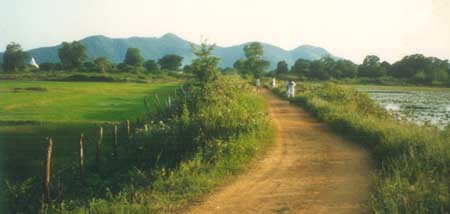
|
|
Above: Seven hills of Kataragama with Kirivehera dagoba seen at left. Below: Ashta Phala Ruhu Bodhi tree and railing in Mahadevale courtyard.
|
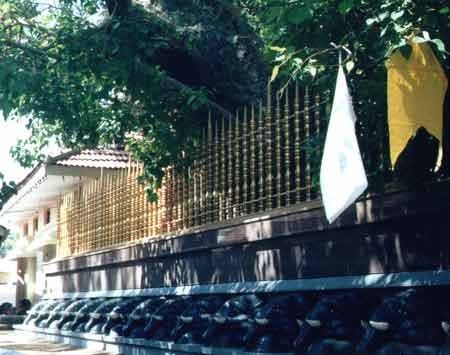
|
It makes no difference if one is a Buddhist, Hindu, Jain, or what. Respect him and have firm faith in him, and he can intervene to settle personal problems that interfere with one's spiritual growth. There are tried and proven ways to obtain his help.
Q: Does the Kataragama God's bodhisattva vow have any connection to the vows ordinary people make?
Soratha: Yes, certainly. Of course, a bodhisattva's vow to attain bodhi (‘awakening') for the sake of all beings is a far more difficult vow to keep than the worldly vows of ordinary people. But the principle of the vow remains the same.
Although very simple, a vow well-kept holds tremendous power. When a monk keeps his holy vows intact, he becomes worthy of worship by gods and men, for instance.
Long, long ago a local Kataragama girl, named Valli Amma, took a severe vow that she would not marry or even touch any man except the Kataragama God himself. By the power of her pure vow, the god came to her and helped her to fulfill her vow, even though it meant marrying her.
Such is his karuna or compassion for those who keep difficult vows, just as he is even now keeping the most difficult vow of a bodhisattva.
We Buddhists, after accumulating pin (merit) by such acts as dana (sharing food) or even the simple offering of lights or flowers to the Buddha, then transfer the merit to devas like Skanda-Kumara, who through their high positions are able to increase that merit further for the benefit of others. This way everyone benefits from Buddhist practices.
Q: People say that the Kataragama God Skanda-Kumara is a Hindu god, and so Buddhists should not worship him. What is your opinion?
Soratha: Our Sinhala traditions preserved orally and ancient poems like the Kanda Upata declare that Kataragama Deviyo came to this Sinhala Deepa long ago by boat from North India, just as our ancestor Vijaya and his companions did also.
This god has been living here as long as we have, maybe even longer. He never harms anyone, except those who aim to do injustice or harm to others.
We consider god Kataragama to be one of the Four Guardian Deities of the Sinhala pantheon, perhaps the most powerful one of them all. If Hindus and others wish to worship him, we Buddhists have no objection. He is great enough to satisfy everyone, whatever their background or beliefs are.
Q: Some people say that Buddhists should not worship Hindu deities like Vishnu, Shiva and Skanda. Others say that there is no place in Buddhism for god worship. And yet the worship of these gods is very common among Sri Lankan Buddhists. What is your view on deva worship by Buddhists?
Soratha: Lord Buddha did not reject deva worship. In fact, in the Majjhima Nikaya he advises monks meditating in the forest to practice devatanusati; that is, to give proper respect to local divinities in order to make steady progress in samadhi.
Lord Buddha himself met and accepted the salutations of major deities like Brahma, Indra and others. He never denied the existence of devas. He was a great friend to humans and non-humans alike.
Modern-educated Sri Lankans, influenced by Western misinterpretations of Buddhism, cling to the mistaken idea that Lord Buddha advocated 19th century-style rationalism or atheism. We should protect the Buddha Sasana by accepting the whole body of traditional Buddhist doctrine and practice, and not pick and choose to suit passing fashions of thought.
Q: How should Buddhists show respect for Kataragama Deviyo?
Soratha: When you say ‘Kataragama', you are referring not only to the Deviyo but also to this sacred place by the same name. By respecting Kataragama the sacred place, one also shows respect for Kataragama Deviyo.
So let Buddhists who come to Kataragama leave their quarrels and disputes behind and come with open hearts and minds. Let them follow experienced pilgrims who know the ways of worship in Kataragama.
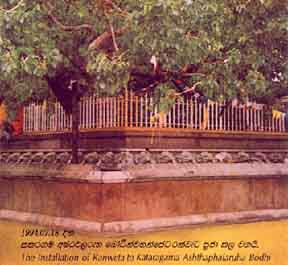
|
|
Ashta Phala Ruhu Bodhi Tree
|
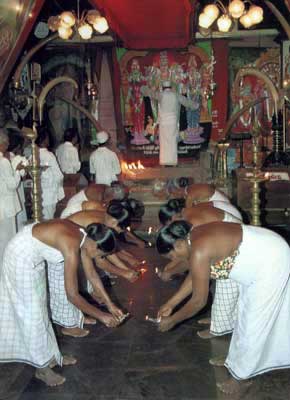
|
|
Kataragama Maha Devale: Alatti Puja
|
Let Buddhists respect not only the bhikkus and swamis and kapuralas of Kataragama, but also the other pilgrims of different religions, and be kind towards the animals and invisible beings of Kataragama also.
Let them respect the Menik Ganga and its inhabitants by not polluting it with soap. Let them respect the unseen spirits of Kataragama by not defacing sacred rocks and trees.
Let them come in the spirit of humble pilgrims clad in white, rather than as noisy tourists publicly displaying ignorance of their own national heritage.
Let them come in humility with respect for deep matters that they cannot claim to understand, so they may return home wiser and richer. That is the best form of worship.
Q: Can Kataragama Deviyo also bring lasting peace to Sri Lanka?
Soratha: I think only Sri Lankan people can do that. We have to learn how to live together happily—not only Lord Buddha only, but teachers of other religions have also shown people how to live in peace.
In Kataragama we also are finding ways to bring lasting peace. For instance, at Kiri Vehera we are conducting computer courses so local youth can have better vocational training, bridge the ‘Digital Divide' and bring good income for their community and family. Without proper education and employment, what peace can there be for young people today?
We have other plans also. Why not declare all of Kataragama Kaele as a Zone of Peace? This idea has been around for years; now is the right time to implement it.
Kataragama could also be developed, not as an industrial zone, but as a spiritual and educational zone. After all, Kataragama is already a kind of spiritual university, with departments of Buddhism, Hinduism, and Islam, as well as traditional sciences like astrology, Ayurveda, etc.
The Hon. Prime Minister himself has also expressed interest in developing Kataragama along these lines. We could be saving our Sri Lankan culture and civilization, and protect the sacred environment of Kataragama Kaele at the same time. People from around the world would come here to learn philosophy, arts and mediation in a sacred setting. Kataragama is already an authentic spiritual university; so why not develop it further and encourage people of all ages and religions to come here and learn authentic spirituality?
Q: The Kataragama Esala festival is said to be closely associated with Sinhala Buddhism. Can you explain with examples?
Soratha: Certainly. There are plenty of examples. Let me give just a few.
Before any perahera festival, the Lekham Mahattaya (Secretary) must visit Kiri Vehera to offer bulath (betel chew) to the chief incumbent and take Pancha Sil (Five Precepts) before fixing the festival dates and inviting the Sangha's participation.
At Kataragama, the Basnayake Nilame and the kapuralas must be Buddhists.
Buddhist religious duties in the Maha Devale, or Pirith Nilaya, may be performed only by bhikkhus of Kiri Vehera Raja Maha Viharaya.
Always before Deviyo puja, first Buddha puja is offered to Lord Buddha.
How do kapuralas transfer duties on masa-poya (amavaka new moon)? First the Kapu Mahattya must come to Kirivehera the previous night to offer gilampasa (light refreshments) and flowers and transfer the merit to the Deviyo. After this only the Maha Devale key is transferred to the incoming Kapu Mahattaya.
